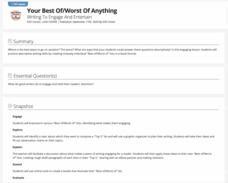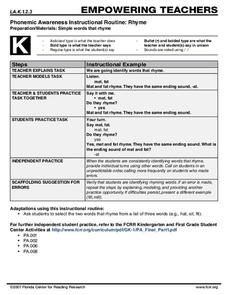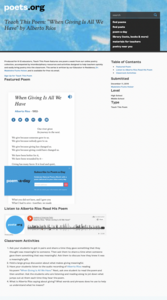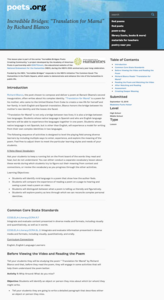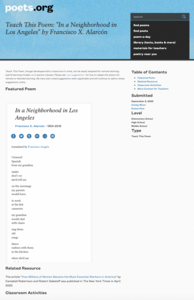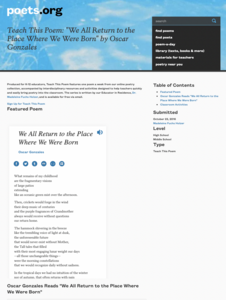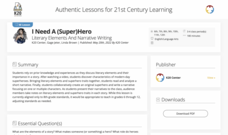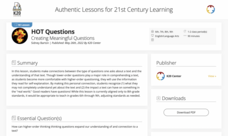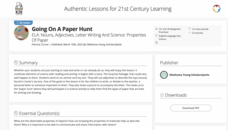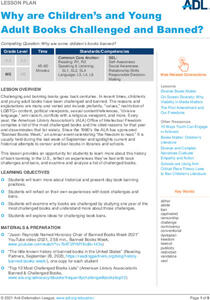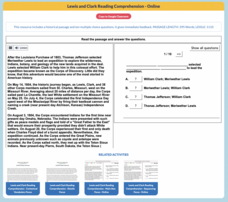K20 LEARN
Your Best Of/Worst Of Anything: Writing To Engage And Entertain
It was the best of places! It was the worst of places! Middle schoolers practice their descriptive writing skills by creating an e-book about the best of/worst of topics. A series of activities about descriptive writing and worksheets...
National Endowment for the Humanities
Frances Ellen Watkins Harper’s “Learning to Read”
Frances Ellen Watkins Harper's poem "Learning to Read" is the focus of a lesson that teaches middle schoolers how to do a close reading of a text. The lesson introduces them to a brief biography of the poet, includes a video reading, and...
Florida Center for Reading Research
Phonemic Awareness Instructional Routine: Rhyme
As a class, kindergarteners identify rhyming words. The teacher provides an example of a rhyming pair and explains why they rhyme. Individual learners then respond by saying a word that rhymes with a given word.
Curated OER
Vocabulary Instructional Routine: Identify and Sort Common Objects into Categories
Kindergarteners build vocabulary by learning about categorization. They discuss the attributes of living and non-living things. As a class, they view and sort pictures into each category. They discuss the word category and what it means.
Anti-Defamation League
The Name Jar: Discussion Guide for Grades Pre-K–1
A lesson spotlights the story, The Name Jar, by Yangsook Choi. After a read-aloud, the class retells the story using puppets or dress-up. They participate in a thoughtful discussion about the story, answer questions relating the book to...
Learning for Justice
What is Empathy?
Young scholars examine facial expressions to identify emotions, listen carefully to stories, and choose the appropriate reaction. Partners choose one story to rewrite, showing empathy for others.
Academy of American Poets
Teach This Poem: "Tamales on Christmas" by Christian Robinson
A lesson spotlights the poem "Tamales on Christmas" by Christian Robinson. Scholars discuss their favorite foods and then examine a lively picture of a family preparing tamales. After listening to the poem twice, learners participate in...
Academy of American Poets
On "El Florida Room" by Richard Blanco
Scholars of all ages examine Richard Blanco's poem, "El Florida Room." Looking closely at pictures, pupils look for details that stand out to them, then read the poem. A whole-class discussion allows learners to reflect on what they...
Academy of American Poets
Teach This Poem: "When Giving Is All We Have" by Alberto Ríos
What makes giving meaningful? Class members discuss this question, then listen to Alberto Rios reading his poem, "When Giving Is All We Have." Finally, the class considers what the poet says about the question.
Academy of American Poets
Incredible Bridges: “Translation for Mamá” by Richard Blanco
Who or what do you miss? That's the question that launches an activity that asks writers to craft a paragraph filled with sensory details that shows how they feel. Next, they listen to Richard Blanco reading his poem, "Translation for...
Academy of American Poets
Teach This Poem: "When There Were Ghosts" by Alberto Ríos
Before cell phones, tablets, and computers with access to YouTube, before gleaming multiplexes and even before television, there were small theaters with Saturday night black and white movies. Alberto Ríos's poem "When There Were Ghosts"...
Academy of American Poets
Teach This Poem: "In a Neighborhood in Los Angeles" by Francisco X. Alarcón
After sketching an essential person and reading an article, scholars read the poem "In a Neighborhood in Los Angeles" by Francisco X. Alarcón. They listen to the poem in English and Spanish and record lines that stand out to them. Small...
Academy of American Poets
Teach This Poem: "We All Return to the Place Where We Were Born" by Oscar Gonzales
What do you remember about your childhood home? Scholars listen to Oscar Gonzales reading his poem "We All Return to the Place Where We Were Born" in Spanish and English, then discuss what they learned about Gonzales.
Academy of American Poets
Teach This Poem: "The Snowfall Is So Silent" by Miguel de Unamuno
Cold, beautiful, unique! Class members closely examine John Singer Sargent's watercolor "Snow," taking note of the artist's techniques, and pair up to discuss how the image makes them feel about snow. They then repeat the process with...
Academy of American Poets
Teach This Poem: "November 2: Día De Los Muertos" By Alberto Ríos
Scholars examine a colorful and detailed picture, then view an engaging video in preparation for reading the poem "November 2: Día De Los Muertos" by Alberto Ríos. Learners discuss their observations, feelings conveyed, and the...
Academy of American Poets
Teach This Poem: "The Teller of Tales" by Gabriela Mistral
The poem "The Teller of Tales" by Gabriela Mistral is the subject of a thoughtful lesson that allows scholars to listen to or read the poem, then discuss its meaning.
K20 LEARN
I Need A (Super)Hero: Literary Elements And Narrative Writing
Need a hero? Super! Groups create their modern-day marvel and craft a narrative with all the elements required in such a tale.
K20 LEARN
HOT Questions: Creating Meaningful Questions
Scholars examine a list of questions and sort them into corresponding groups based on similarities. A gallery walk allows peers to see how their peers sorted questions and leave notes. Costa's Level of Questions is the topic of a...
K20 LEARN
Going on a Paper Hunt: Nouns, Adjectives, Letter Writing and Science - Properties of Paper
A lesson introduces scholars to nouns and adjectives. After listening to a short story and practicing creating adjectives with a card sort, pupils go on a paper hunt to locate different types of paper, complete a chart with adjectives,...
Anti-Defamation League
On-Screen Diversity: Why Visibility in Media Matters
Characters play a significant role in why we like certain shows and movies but are the characters we watch representing the diverse society in which we live? Scholars examine this question through thoughtful discussion about popular...
Overcoming Obstacles
Giving Presentations
With their action plans in place, groups now develop a presentation to get others interested in their project. Scholars learn how to present themselves during a presentation and elaborate on and add visuals to their presentation. After...
Overcoming Obstacles
Presenting Yourself
"Presenting Yourself," the last lesson in the "Looking to the Future" module, asks participants to review and reflect on what they have learned about themselves in the Overcoming Obstacles course. They review their course folder and...
Anti-Defamation League
Why are Children’s and Young Adult Books Challenged and Banned?
September's "Banned Books Week" brings attention to the number of books that are challenged, censored, or banned each year. After watching a video about banned book week, reading articles about the history of book banning, and examining...
Mr. Nussbaum
Lewis and Clark
An informational text focuses on Lewis and Clark. Scholars read the text and answer 10 questions to test their reading comprehension skills.


